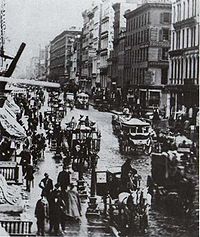Today the Lincoln administration admits Nevada and Colorado into the Union as the newest states. Although far from the theaters of war, the abundance of gold and silver in Nevada, Colorado and other western states and territories are crucial to financing the war against the Confederate States.
Meanwhile, far to the east several of New York City’s prominent Baptist ministers sign their name to a ecumenical “general agreement” concerning the upcoming observance of Good Friday, two days hence. But with the war yet raging, this will be no ordinary Good Friday observance.
The clergy also call for a city-wide day of “fasting, humiliation and prayer” on Good Friday.
The list of clergy signing the document reads like a ministerial who’s who of New York City.
Whereas, the day known as Good-Friday is widely observed throughout the Christian world, in solemn remembrance of the crucifixion of our Lord Jesus Christ for us men and our salvation, the undersigned hereby respectfully propose to their Christian brethren of this City a general agreement in that observance, on the coming 25th of the present month, being the day on which Good-Friday this year occurs.
The first object of the proposal, referring to the great fact and doctrine to which the day is devoted, is to declare, by our union in keeping it, the unity of our faith touching the sufferings and death of the Lord Jesus Christ, the Mediator, very God, very man, as the one atonement for the sins of the world.
The second object is to take advantage of the day for an occasion of fasting, humiliation and prayer, in view of our national troubles. Our sins as individuals and as a people, the intense worldliness among us, the rapid and appailing growth of luxury and extravagance, with all their attendant evils, and these, in the midst of the direst calamities and chastisements that can befall a people, call upon us, especially in this City, to humble ourselves before the Almighty Ruler, beseeching Him not to deal with us according to our deservings, to move us to a consideration of our ways, to give us of His Holy Spirit for repentance and reformation, and to turn to Him the hearts of the people, and so be pleased to remove from our land the judgments which we have justly provoked. For this purpose we deem a day appropriate which is already so extensively a religious one, and which, in the sacrifice of the cross, exhibits infinitely beyond all things else the exceeding sinfulness of sin, and the only meritorious ground of availing prayer and intercession.
The foregoing is submitted in Christian deference and love; it comes from brothers to brothers, and neighbors of the same city, within the limits of which, to avoid any appearance of assumption, it is confined.
W.A. MUHLENBERG, St. Luke’s Hospital.
WILLIAM ADAMS, Madison-square Presbyterian Church.
GEORGE POTTS, Presbyterian Church, University-place.
ALEX. H. VINTON, St. Mark’S Church.
WILLIAM R. WILLIAMS, Amity-street Baptist Church,
GEORGE L. PRENTISS, Church of the Covenant.
HENRY B. SMITH, Union Theological Seminary, New-York.
THOMAS H. SKINNER, Union Theological Seminary, New-York.
ROSWELL D. HITCHCOCK, Union Theological Seminary, New-York.
W.G.T. SHEDD, Union Theological Seminary, New-York.
PHILIP SCHAFF, New-York.
E.P. ROGERS, South Dutch Church.
HOWARD CROSBY, Fourth-avenue Presbyterian Church.
A. CLEVELAND COXE, Calvary Church.
MORGAN DIX, Trinity Church.
SAMUEL COOKE, St. Bartholomew’s Church.
THOMAS DE WITT, Collegiate Reformed Dutch Church.
TALBOT W. CHAMBERS, Collegiate Reformed, Dutch Church.
JOSEPH T. DURYEA, Collegiate Reformed Dutch Church.
THOS. E. VERMILYE, Collegiate Reformed Dutch Church.
H. DYEE, Secretary P.E. Society for the Promotion of Evangelical Knowledge.
M.S. HUTTON, Church on Washington-square.
H.B. RIDGAWAY, St. Paul’s Methodist Episcopal Church.
JOHN MCVICKAR, Columbia College.
THOMAS ARMITAGE, Fifth-avenue Baptist Church.
C.F. CRUSE, General Theological Seminary, P.E.C.
SAMUEL R. JOHNSON, General Theological Seminary, P.E.C.
N.E. CORNWALL, St. Mathias Church.
JOHN M. KEEBS, Madison-avenue Presbyterian Church.
A.P. BOTSFORD, East Eighty-sixth-street Presbyterian Church.
S.F. FARMER, Twenty-eighth-street Presbyterian Church.
S.D. BURCHARD, Presbyterian Church, Thirteenth-street.
FREDERICK BUSCHE, of German Reformed Church, Suffolk-street.
G. JARVES GEEE, St. Timothy’s Church.
F.E. LAWRENCE, Church of the Holy Communion.
R.S. HOWLAND, Church of Holy Apostles.
HENRY E. DECKER, President; M.B. RIDDLE, Clerk.
EDWARD LATEROP, Tabernacle Baptist Church.
DANIEL WISE. Corresponding Secretary, S.S.V., M.E. Church.
ROBERT RUSSELL BOOTH, Mercer-street Presbyterian Church.
W.W. NEWELL, Allen-street Presbyterian Church.
EDWIN F. RATFIELD, Ninth-street Presbyterian Church.
SAMUEL HARRISON COX, New-York.
J.H. KUMMER, Moravian Church.
C.F.E. STOHLMANN, St. Matthew’s Church, Evan.
Lutheran.
HENRY M. FIELD, editor of Evangelist.
THOMAS S. HASTINGS, West Presbyterian Church.
T.S. CHAUNCEY, St. James’ Church, Yorkville.
JOSEPH HOLDICH, Corresponding Secretary of the American Bible Society.
A.H. BUDDINGTON, South Baptist Church.
THOMAS HOUSE TAYLOR, Grace Church.
JOHN B. HAGANZ, Beaford-street Methodist Episcopal Church.
HENRY E. MONTGOM ERY, Church of the Incarnation.
HENRY J. FOX, Seventh-avenue M.E. Church.
J. RALSTON SMITH, Seventh Presbyterian Church.
JOHN COTTON SMITH, Church of the Ascension.
JAMES L. SHOCK, St. James’ Church, Evan. Lutheran.
E.S. JAMES, Bishop M.E. Church.
STEPHEN H. TYNG, St. George’s Church, Stuyvesant-square.
And many others, whose names would appear, had there been time to obtain them.
NEW YORK, March 21, 1864.
Sources: “Act of March 21, 1864, Public Law 38-30, 13 STAT 30, which admitted Nevada as a state in the Union and enabled its people to form a constitution and state government., 03/21/1864,” U.S. National Archives (link); “An Act to enable the People of Colorado to form a Constitution and State Government, and for the Admission of such State into the Onion on an equal Footing with the original States.,” in Statutes at large, treaties and proclamations of the United States of America: from Dec. 1867, to March 1869, Volume 13, Boston: Little, Brown and Company, 1866, pp. 32-34 (link); “Christian Circular,” New York Times, March 23, 1864 (link)



